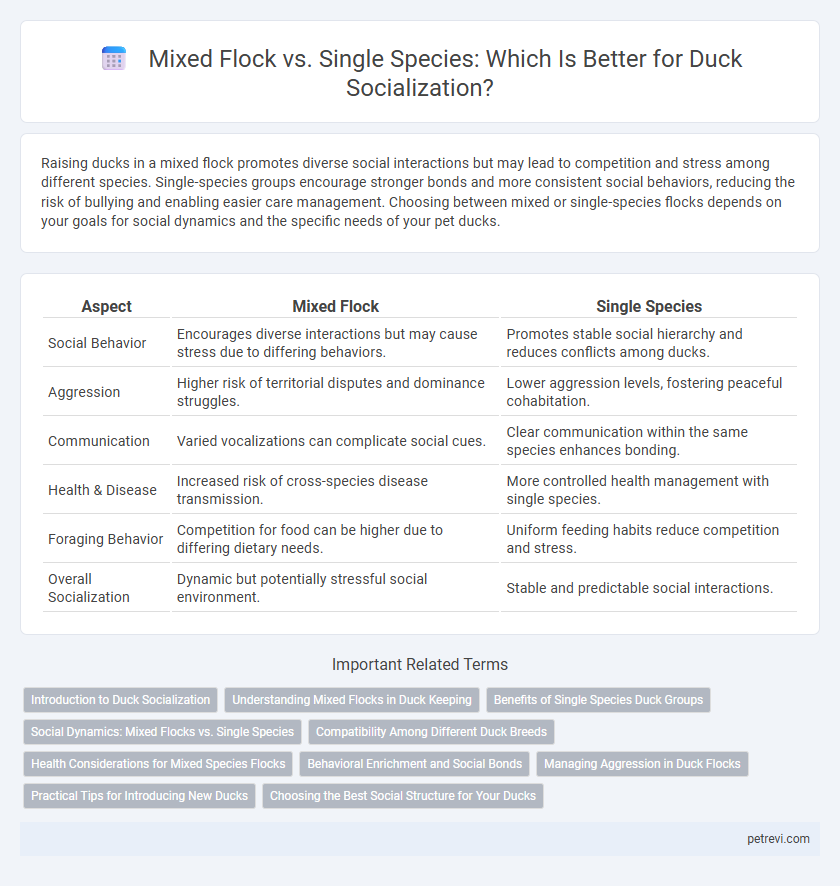Raising ducks in a mixed flock promotes diverse social interactions but may lead to competition and stress among different species. Single-species groups encourage stronger bonds and more consistent social behaviors, reducing the risk of bullying and enabling easier care management. Choosing between mixed or single-species flocks depends on your goals for social dynamics and the specific needs of your pet ducks.
Table of Comparison
| Aspect | Mixed Flock | Single Species |
|---|---|---|
| Social Behavior | Encourages diverse interactions but may cause stress due to differing behaviors. | Promotes stable social hierarchy and reduces conflicts among ducks. |
| Aggression | Higher risk of territorial disputes and dominance struggles. | Lower aggression levels, fostering peaceful cohabitation. |
| Communication | Varied vocalizations can complicate social cues. | Clear communication within the same species enhances bonding. |
| Health & Disease | Increased risk of cross-species disease transmission. | More controlled health management with single species. |
| Foraging Behavior | Competition for food can be higher due to differing dietary needs. | Uniform feeding habits reduce competition and stress. |
| Overall Socialization | Dynamic but potentially stressful social environment. | Stable and predictable social interactions. |
Introduction to Duck Socialization
Ducks thrive in social environments where natural behaviors like foraging, preening, and vocal communication are encouraged. Mixed flocks offer diverse interaction opportunities, promoting adaptability and reducing aggressive behavior through varied social cues. Single-species groups provide focused social bonding and hierarchy establishment, fostering stability but limiting behavioral diversity compared to mixed-species settings.
Understanding Mixed Flocks in Duck Keeping
Mixed flocks of ducks, consisting of multiple species, encourage diverse social interactions and natural behaviors, enhancing mental stimulation and reducing aggression. Single-species groups often exhibit more uniform communication and hierarchy, which can simplify management but may limit social enrichment. Understanding species compatibility, size differences, and behavioral traits is crucial for successful mixed flock integration in duck keeping.
Benefits of Single Species Duck Groups
Single species duck groups foster stronger social bonds, reducing aggression and stress among individuals. Maintaining uniform species in flocks ensures consistent behaviors and communication, improving overall welfare and ease of management. These groups also simplify dietary and habitat requirements, promoting healthier environments for all ducks involved.
Social Dynamics: Mixed Flocks vs. Single Species
Mixed flocks of ducks foster diverse social dynamics by promoting interspecies interaction, which can enhance behavioral enrichment and reduce species-specific stress through varied communication cues. Single species flocks tend to have more consistent social hierarchies and synchronized behaviors, allowing for clearer dominance structures and reduced conflict within the group. Understanding these social nuances is crucial for optimizing duck welfare and minimizing aggression in both mixed and single-species environments.
Compatibility Among Different Duck Breeds
Mixed flock environments encourage natural social behaviors and reduce stress by promoting interaction among diverse duck breeds such as Khaki Campbell, Pekin, and Muscovy. Compatibility among different breeds depends on temperament, size, and activity level, with more docile breeds like Call Ducks thriving alongside calm companions, while aggressive breeds may cause conflict in mixed groups. Selecting breeds with similar social habits and ensuring ample space helps maintain harmony and overall flock health in mixed-species duck socialization.
Health Considerations for Mixed Species Flocks
Mixed species duck flocks increase the risk of disease transmission due to varying immune system strengths and pathogen susceptibilities. Parasites and infections can spread more easily when different duck species share water and feeding areas, leading to compromised health. Maintaining proper sanitation, quarantine of new birds, and regular health monitoring are crucial to reduce health risks in mixed flocks.
Behavioral Enrichment and Social Bonds
Mixed flock environments encourage diverse behavioral enrichment for ducks by stimulating natural foraging and varied social interactions, enhancing cognitive development. In contrast, single species groups foster stronger social bonds through consistent communication patterns and established hierarchies, promoting stability and reduced aggression. Both settings play crucial roles in improving overall duck welfare by addressing different aspects of socialization and mental engagement.
Managing Aggression in Duck Flocks
Mixed flock duck socialization requires careful management of aggressive behaviors, as different species often exhibit varying dominance hierarchies that can increase conflict. Establishing ample space, multiple feeding stations, and separate resting areas helps reduce territorial disputes and stress among ducks. Monitoring interactions closely and introducing new birds gradually supports a harmonious environment, minimizing injury risks in mixed-species flocks.
Practical Tips for Introducing New Ducks
Introducing new ducks to a mixed flock requires gradual integration to minimize aggression and stress. Allow new ducks to observe the existing group from a separate enclosure for at least one week before supervised interactions, gently monitoring behavior and providing ample space. Offer multiple feeding stations and hiding spots to reduce competition and promote harmonious socialization.
Choosing the Best Social Structure for Your Ducks
Selecting the ideal social structure for ducks hinges on understanding flock dynamics and species compatibility. Mixed flocks, combining different duck species, can promote diverse interactions but may lead to dominance hierarchies or stress if territorial instincts clash. Conversely, single-species groups offer uniform social behaviors and reduce aggression, fostering a stable environment essential for optimal duck socialization and welfare.
Mixed Flock vs Single Species for Duck Socialization Infographic

 petrevi.com
petrevi.com